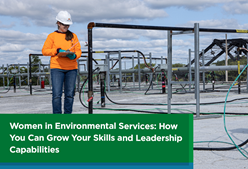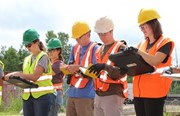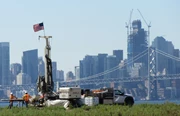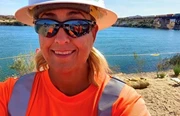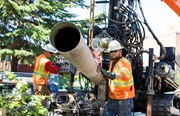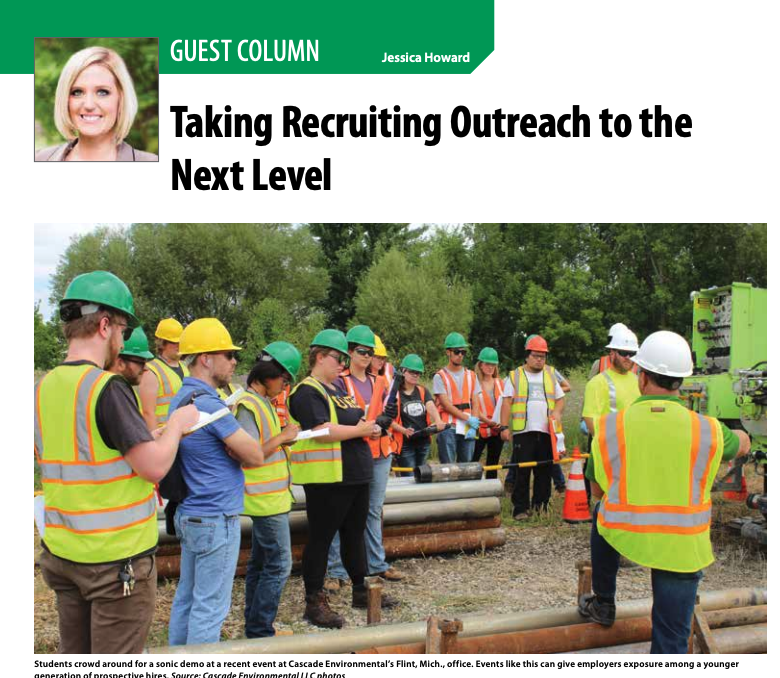Like many mechanically-minded people, Vinny Mesuda has been taking things apart and putting them back together since he was a young child. His curiosity about how things work led him to a career working with heavy duty engines and machinery, and then to cross-train as a driller and probe operator at Cascade. In this blog post, Vinny tells us how he got his start as a mechanic, how he ended up in the environmental services industry, and what a typical day looks like for him as senior mechanic (and occasional driller).
What career did you envision for yourself as a child? Why did it appeal to you?
When I was a child, I envisioned myself as an industrial electrician. I was interested because my father ran a family business, Mesuda Electric, and I always had to know how things worked. I would take apart my toys and open child security locks, but electricity was invisible which made it more interesting. I also got to see some of my father’s completed jobs, and liked the idea of being on a project and building something big.
I was also interested in being a mechanic, starting when I rode in my dad’s work truck and it broke down. We sat on the side of the road, and I didn’t understand why it happened. From that moment on, I never wanted to break down in a car and I wanted to understand what happens under the hood. I was fascinated by the idea of pouring gasoline in the tank of a vehicle, and it being converted in the engine into horsepower that moves you down the highway.
What got you interested in a career in drilling/environmental services?
I became interested because I knew nothing about it. I had mastered gasoline and diesel engines as a full-time mechanic, and my twin brother, who was working for Cascade Environmental, would tell me about drill rigs and well installations and soil sampling. It seemed like something I would be interested in seeing.
How did you get the education and/or training you needed?
I went to SUNY Canton’s Canino School of Engineering in upstate New York for an associate’s degree in Automotive Technology. After school I felt like I knew everything I needed, but man was I wrong! I found out I’m more of a hands-on learner. I started as a diesel mechanic, and worked with other mechanics on new problems that rolled into the shop every day—which is how I grew my skill in diagnosing problems and methods of repair. When I started at Cascade, I understood how things worked well enough that I could look at one of our probe rigs and simply see it as a diesel engine that powers a hydraulic pump.
How did you hear about Cascade, and why did you decide you wanted to work here?
I heard about Cascade from my twin brother, Joe Mesuda, who was hired a year and a half before me. He’d tell me stories about the places he’d been and interesting jobs he worked on, and call me up (instead of the drill rig manufacturer) with questions and help with diagnosing engine problems. Without having even seen one of these machines before, I would be able to help him get them running. I decided to apply because I wanted to see and work on these rigs myself, and thought it would be interesting to travel for work as well.
What were you doing professionally before you joined Cascade and/or this industry?
Before I joined Cascade, I was a heavy-duty diesel mechanic. I worked on tractor trailers, heavy machinery, race cars, hot rods, and your typical everyday cars.
Since joining the company, have you had opportunities for mentorship, to further your training, or to earn certifications? If so, please explain what they were and if you’ve found them helpful.
I came to Cascade with a lot of experience already under my belt, but learned a lot about our rigs and trucks by digging in and working on them. During my first two years, I’ve been in the field drilling and have been mentored and trained on environmental probing. Robert Maskos, a senior driller with Cascade, taught me almost everything I know about drill tooling and methods of drilling. What I’ve learned in the field has been very helpful to me, and makes me a better asset to the company because I can be used as both a field mechanic as well as an environmental driller.
What does a typical work day look like for you?
Every workday is something new for me. Most days, I come into the shop and have a list of issues a driller may have had with a rig or a support truck. I’ll check the equipment out, find the issue, repair, and find the underlying cause in order to prevent the issue from coming up again. Sometimes I’ll come in, and a project manager will have a job coming up that needs specialized tooling. On those days, I’ll design and fabricate what is needed. Often, I will get a call from someone in the field, and I’ll help them diagnose and solve the issue over the phone. In I can’t troubleshoot by phone, I’ll end up on a road call and bringing the parts I think I’ll need to perform a field repair.
Some days I’m in the field as a driller’s assistant or driller. On those days, I’ll meet the crew at the shop, load and hook up to the equipment trailers, then mobilize to the job. We’ll drill for the day, get the job done, then come back and unload. During days in the field, I still usually get calls for mechanical advice, and I keep a list in my notebook of what needs to be addressed when I return to the shop.
What do friends or family say when you tell them about your career?
When I tell friends or family about my career, they typical ask me questions about it. Most people do not know much about the environmental services field, and ask about what we do as a company and how it makes a difference.
What advice would you give other people who might be considering a career in drilling/environmental services?
The advice I would give to someone who might be considering a career in environmental services is to try it! There is so much to learn, most of which is interesting material that you won’t see anywhere else. There is also so much more than just being a driller, especially in remediation there are many other jobs and chemical knowledge that people don’t know exists.
What advice would you give someone interested in a career as a mechanic?
The advice I would give to someone interested in a career as a mechanic for Cascade would be to not be scared of all the new equipment. Typically in a diesel/auto shop, you are working on cars or trucks every day, and get very familiar with certain engines/makes/models. With that experience you can work on any car or truck. However, our equipment is usually specialized machinery that you will likely not have prior experience working on. There’s a small learning curve, but our machines are very simple when broken down, and general mechanical knowledge and the chance to see how they work will make them easy to understand. If you can work on a car or truck, then you are not that far off from understanding our drill rigs.
Interested in learning more about becoming a Mechanic in the environmental services industry? Check out our current openings for more information.
